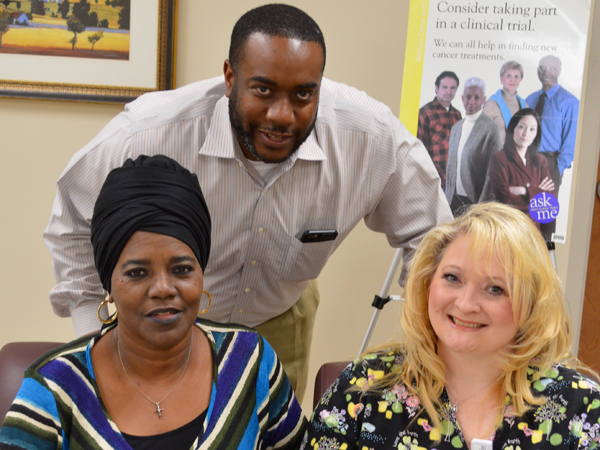Clinical trials result in more, better cancer therapies

Phyllis Hamberlin of Vicksburg knows others set the foundation for the therapy she receives today for myeloma, a cancer of the plasma cells.
Now, she's doing the same: participating in a clinical trial that her doctor at UMMC hopes will improve this therapy for her and for others.
“It's been working for us,” she said recently. For this trial she had an additional incentive: It helps pay for some of her medications.
“In a good clinical trial, you try to find a good standard of care and add something to it,” said Dr. Tondre Buck, a hematologist/oncologist at UMMC and Hamberlin's primary physician. “You wouldn't have gotten to the standard of care without clinical trials.”
Clinical trials are crucial in getting the latest research into clinics where they can make a difference in human lives, said Dr. Tate Thigpen, head of the UMMC Division of Hematology/Oncology. Trials such as the one Hamberlin entered help refine treatment recommendations, he said.

Overall, Thigpen said, more clinical trials are needed on existing FDA-approved drugs. Those might give physicians ways to fine-tune dosage, provide details on how often to use them, and identify other elements central to offering the best cancer care possible.
Other trials of new medications are adding years to survival rates.
“If you compare today to 1975, the median survival from ovarian cancer was nine months,” Thigpen said. “Today it's 3.5 to 5 years. That's progress. Now, 25 percent never have a recurrence. In 1975, it was close to zero.”
Clinical trials cover multiple cancer-fighting fronts, from prevention to sequence of therapy to testing new therapies.
Buck said the trial in which Hamberlin is participating is designed to figure out the timing of bone marrow transplant for patients with myeloma. In Hamberlin's case, her stem cells were harvested and are being kept until she needs a transplant. In the meantime, she receives the same medications and care she would have received had she not been on the trial, Buck said.
“This doesn't happen in all trials,” he added.
Some patients in the trial receive the transplant under current guidelines; ohers will get one when their disease shows it is progressing.
Buck traced the advances. “Since 2000, approximately 12 new drugs for myeloma have been developed,” he said. “We've had three new drugs in the last few months. All aid in improving survival.”
Survival is a key goal for Buck, who saw a mentor die of this cancer soon after he started practicing.
“Ten years ago, the median progression-free survival was 2.5 years. Now it's six to seven years,” he said.
While this trial is seeking ways to improve an already-approved therapy, many trials test new medications.
“Trials may offer a last hope for people with bad disease,” Buck said. “If you're in the later stages of a cancer, I think you'd want to be in a clinical trial. You're likely getting access to therapy that isn't widely distributed yet.”
In Mississippi, he said, there's a stigma attached to clinical trials.
“In Boston, where I did some of my training, patients came in looking for clinical trials,” he said.
Trials are important to Mississippi, he said.
“We have a large ethnic population. Because of the molecular makeup of cancer, it's important to get different groups involved. Perhaps the drugs work better for one group than another.
“If doctors know that, they can give better treatment recommendations.”
This trial, like many others, includes gene expression profiling. More cancer research is directed in that area, said Dr. Srinivasan Vijayakumar, Cancer Institute director and head of radiation oncology.
“Our knowledge about cancer is growing dramatically and much is centered on changes in an individual's cancer cells or their DNA,” Vijayakumar said.
Buck encourages patients to consider a clinical trial if it is appropriate for them.
Teresa Witcher, a clinical research nurse who works with Buck on many of the blood-related clinical trials, said her job is to follow the doctor and explain the prospective trial in detail to a patient. When someone joins a trial, she reviews information from each appointment, keeps in touch with the patient and tries to make sure he or she understand what comes next.
Witcher reviews all lab tests being reviewed by Buck and nursing staff, then enters them in a database that throws up red flags if something is outside standard numbers.
Most patients agree to participate in a trial because they want to help others in the future or because they believe the trial offers them more up-to-date therapy than they could receive with standard of care.
Their cooperation comes with fears, though: “They're afraid they'll only get a placebo or that they'll be treated like lab rats,” Witcher said. Trials exist to help, not hurt, she said.
Buck and Witcher said patients on clinical trials are rock stars who are helping pave the way for better therapy around the nation and world.
Most adult cancer clinical trials offered at UMMC are Phase 3 or Phase 4 trials, Buck said. Those are refining how new medications should be given and testing to see how effective they are in different ethnic groups. Those drugs already have shown they help cancer patients in smaller Phase 1 or Phase 2 trials.
Patients can withdraw from a clinical trial at any time, he said. And, if doctors see the trial isn't helping, they can withdraw the patient.
Buck said clinical trials are a means to improve therapy for the patients he has now and those he'll see in the future.
“People should keep an open mind,” he said. “You should be thinking about clinical trials any time you come into a doctor's office. The goal is to always look for something better.”

University Cancer Care works with national groups that offer clinical trials for many types of cancer and with industries testing new therapies. All trials are approved by the UMMC Institutional Review Board before they can be offered to patients. Find out more about UMMC cancer clinical trials at /cancerclinicaltrials/


